Ellinor's Litventures
This blog is about my literary adventures in different genres. I like variety in my reading and will read books from most genres but particulary book with some literary merit.
A Banquet of Consequences by Elizabeth George
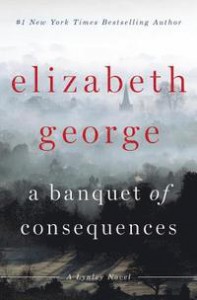
Clare Abbott, a well known feminist writer, is poisoned. A few days later her editor almost dies as well. But were the two really meant to be the victims or was someone else actually the killer's target?
With this 19th installment in the Inspector Lynley series the old Elizabeth George is finally back! And it was high time for that. After the really bad Just One Evil Act I was about to give this series up. I'm glad I didn't because this book was so good. My expectations weren't very high but once I started reading I couldn't put the book down anymore.
What I found very interesting was the Lynley-Havers constellation: Havers is doing the actual work this time and is almost instructing Lynley what to do next. Lynley is of course still the supervisor but is really in the background. This worked very well and I'm very curious where this is leading. There are also some (positive) changes in both their lives which makes me look forward to the next book a lot.
The crime itself was excellent even though I knew who the killer was quite early. But this just shows how well constructed it was. The characters were well created (I will probably never forget the highly manipulative Caroline) and the many twists and turns made this an exciting read. Let's hope that the series will stay this way!
(I received a free digital copy via Netgalley/the publisher. Thanks for the opportunity!)
 9
9
The Shepherd's Crown by Terry Pratchett

Terry Pratchett was not able to fully complete this novel before his death. This is sad but also brings us so much closer to him: In the afterword we can read how he wrote his novels, that he had several scenes on his mind and then constructed the story as he went along. Most of The Shepherd's Crown is finished but there are also some scenes which don't seem to be much connected with the rest of the stoy. That doesn't matter, however. The book is still a fun and quick read.
But at the same time it's a sad read, not only because it's the final Discwolrd novel but also because of Granny Weatherwax's death. She was such a great character and Discworld is just not the same without her.
We will miss you, Terry Pratchett!
(I received a free digital copy via Netgalley/the publisher. Thanks for the opportunity!)
Just One Evil Act by Elizabeth George
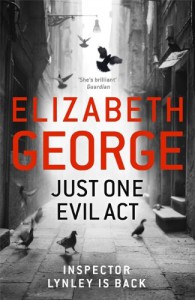
I've had my problems with the Lynley books ever since Helen's death. What still kept me reading them were the main characters, especially Barbara Havers. She's very special and I like her unorthodox methods. But in Just One Evil Act Barbara's behaviour often was hardly bearable. She acts extremely immature, naive and often simply stupid. While this is partly understandable especially when you look at the miserable live she's leading it makes reading this book very tedious.
On top of that the actual crime seems very contrived and obvious. Most of it is set in Italy and Elizabeth George seems to use every possible cliché, not just on Italy and the Italians but also on Pakistanis/Muslims and private investigators.
What makes me still want to continue reading this series is how the book ended (except for Azhar's story): Things seem to progress in Lynley's private life, Barbara finally is in her right mind again and Isabelle Ardery even looks human. I'm curious for the next volume and how things will continue!
The Girl in the Spider's Web

I absolutely loved The Girl with the Dragon Tattoo, it was one of the best thrillers I ever read. The Girl Who Played with Fire and The Girl Who Kicked the Hornet's Nest were good thrillers but they weren't as exciting as The Girl with the Dragon Tattoo. They both focused heavily on Lisbet Salander's past and her family history.
The Girl in the Spider's Web is following this path as well. Now that Lisbet's father and half-brother are dead the focus is on her lost sister Camilla who inherited her father's business. Like in the previous books there is another storyline as well. Here it is about intellectual property theft and an autistic boy. However, this story seems very unlikely and badly constructed. There are also too many new characters which first are described in rather great detail but in fact remain very superficial and the role they play often is quite unimportant.
It's obvious where all of this is leading: the next one or two books will deal with Lisbet's fight against her sister. But she will have to fight without me following her. This book convinced me that my time with Lisbet and Mikael is over. Especially after the final sentence: After Lisbet and Mikael seem to have made peace with each other it says "And outside a star fell from the sky." Ugh, that just sucks!
 10
10
Go Set A Watchman by Harper Lee

I can understand why lots of readers will give this book a negative rating: Atticus Finch, this beloved character from To Kill a Mockingbird now suddenly doesn't look so bright anymore. He turns out to be a racist who also attended meetings of the Ku-Klux-Klan. This revelation will clearly be a shock to many. But when you come to think of it and also when you read his explanation he gives to the shocked Scout (now always referred to as Jean Louise) you can understand it. When he defended the black boy in To Kill a Mockingbird he did this because the boy clearly was innocent. When it comes to his world - the Old South - however, he sees it threatened by the Negroes' fight for more rights.
For me the American South has always been a strange place and also kind of a mystery. The deep religiousness feels very weird to me. I also don't understand how 150 years after the Civil War and 50 years after the Civil Rights Movement there can still be such deep conflicts between black and white people. This book tries to give an insight into this society: At some places it succeeds pretty well, other places (e.g. Calpurnia's behaviour towards Jean Louise) still remain blurred.
The book is a quick and easy read - most of the time. It is told in the third-person from Jean Louise's point of view. Sometimes when her thoughts are described this is done by a first-person narrator. This often comes out of the blue and completely doesn't fit in with the rest of the text.
Despite the serious topics this book also has many funny scenes. My favourite is the one quite at the beginning when the children react the revival.
All in all the writing seems very modern, often not at all like something written in the 1950s. This of course leads me to the entire topic of the publication of this book. It's sometimes hard to believe that Harper Lee really wrote it herself. There will surely be experts comparing her two novels and analysing the similarities in style etc. What I'm sure of however, is that Harper Lee still didn't want this book to be published and was tricked into this by her lawyer (Harper Lee is deaf and half-blind after a stroke). Her sister died a short time ago and couldn't take care of her sisters interests anymore. So now was the perfect timing to publish this novel - who knows what a last will might reveal.
Go Set a Watchman shouldn't be read without having read To Kill a Mockingbird first. To many things from the first book are revealed and you often wouldn't understand what is going on in the second book without having read the first one.
As I said in the beginning, it is not a bad book but it also isn't a book you definitely have to read. I can understand positive and negative opinions of it and also people who are content with just having read To Kill a Mockingbird.
 7
7
Arcadia by Iain Pears

With Arcadia Iain Pears is trying an experiment: He wrote a novel whith several interwoven storylines which can be read in the traditional way from cover to cover. At the same time he created an app which depicts how the storylines are interwoven and which enables the reader to read the different stories independently and switch from one to other whenever feeling like it or one two or more of the characters' meet. All of this sounds great and it was great to read and to work my way through the app at the same time - but only up to a certain point.
There are three different settings in this novel: Oxford in 1960, Mull, an island off the Scottish coast in around 2200 and Anterworld, a fictional realm with somewhat medieval structures. There are 10 different (main) characters whose stories can be followed. There are timetravel, a spy-story, a murder mystery, a love story etc. This sounds a bit complicated - and it is. You really have to concentrate to remember where in which storyline you currently are, who is who and when is when. The confusion is usually settled once you reach the point when two characters meet but this often takes very long.
The novel is quite complex but at the same time most of the storylines seem very trivial. The Young Girl's Tale was my favourite until it became a rather ridiculous lovestory. The spy story was so very predictable as was the murder mystery. All the time I was waiting for something great, absolutely new to happen. And when that finally seemed to be the case the novel simply ended and too much was left unexplained. Maybe I just didn't understand it (I sometimes have my problems with the logic in timetravels). I was also quite disappointed by the way most storylines ended, either somehow disappointing and unfinished or once again very trivial.
At the beginning I really liked the app. It gave more structure to the novel and made it easier to follow the story. There was also additional info on Anterworld which explained why Prof. Lytten constructed it the way he did. But once the story progressed I noticed that there were simply some flaws in the app. The app shows the different characters' stories as lines which cross when the characters meet. To be completely correct they would have to be ordered so that they show how the events happen chronologically to each character. I can understand that this is not always manageable because it would give away too much of the story but in the Assisstant's story this makes the app just wrong and useless.
(I received a free digital copy via Netgalley/Faber & Faber. Thanks for the opportunity!)
 7
7
Slade House by David Mitchell

Reviewing this book without giving away too much of its content is difficult. Let's call it a haunted house story even though it is not quite that. The novel consists of five different stories. In each of them another character is lured into Slade House which always appears in a quite different light. Nothing good will come to the characters but you'll have to find out for yourselves what is happening.
Slade House is a quick read and I really enjoyed the suspenseful writing. It never got boring even though the basic story of each chapter is the same. In fact I was always quite excited if the characters were able to escape. I first thought that the outcome would be quite predictable but I was still surprised at the twists and turns.
Slade House is a sidekick of The Bone Clocks which I haven't read (so far). I didn't know that before starting to read Slade House. I think the two can be read independently, but maybe I would have understood the final chapter I bit better if I had read The Bone Clocks first. On the other hand I hope that Slade House doesn't give away too much of the story told in The Bone Clocks.
If you are looking for a good scary read for a foggy autumn night Slade House is a really good option.
(I received a free digital copy via Netgalley/Random House. Thanks for the opportunity!)
 8
8
All the Light We Cannot See by Anthony Doerr

All the Light We Cannot See is a rare gem among WWII novels - and not only because a gem plays an important role. What makes the book so special is that it is so positive even though a lot of harm comes to most characters and not all storylines come to an happy end.
The book tells the story of two protagonists, Marie-Laure a blind French girl whose father built her a model of the surrounding neighbourhood so she can find her way around, and Werner a German orphan who studies at a Napola mainly to be able to later study with the famous scientists. The fate of these two is linked and they play a very important role in each others life even though they only meet for a few short hours.
Anthony Doerr uses a very beautiful language and often quite detailed descriptions which never seem too long or boring. The novel appears to be very well researched. The short chapters make it a very quickpaced read even though the time period narrated is quite long. The novels is quite suspenceful and I was hooked from the first page. Definitely a worthy winner of the Pulitzer!
(I received a free digital copy via Netgalley/the publisher. Thanks for the opportunity!)
 8
8
The Mysterious Disappearance of the Reluctant Book Fairy by Elizabeth George

I've been a fan of Elizabeth George's mystery novels for several years and consequently I was excited about this new story. The title and the series's name "Bibliomystery" made me expect a crime novella. It turned out that I was mistaken. After the first few pages I thought I wouldn't like the story too much because of that and also because it is set on Whidbey Island and has a (however small) supernatural element like Elizabeth George's YA series (which I don't appreciate that much). But I soon began to enjoy the story. It is written in a beautiful way with lots of allusions to other literary works. It reminded me a bit of Jasper Fforde's Thursday Next books, just without so much humour.
It made me think which story I would like to live. I have to admit that this was pretty difficult for me. I like novels full of suspense, but living through one probably wouldn't be my kind of thing. I also enjoy classics but I don't want to miss most of the modern comforts. Chick-lit and romance can get very dull after some time. So what is left? Feel free to comment and tell me which story you would pick. I'm very curious!
(I received a free digital copy via Netgalley/the publisher. Thanks for the opportunity!)
 6
6
Dreaming Spies by Laurie R. King
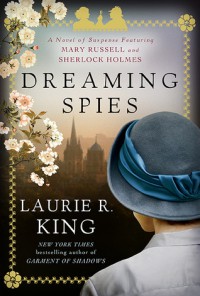
This was the first book in the Mary Russell series for me. I had heard positive things about it and so I decided to give it a try. Starting a series with one of the later volumes often isn't easy and I have to admit I was a bit confused after the first few pages. But that soon passed and I starting enjoying this novel immensely.
The first thing I have to mention is the language. I really loved it and was so glad to finally read a crime novel written in beautiful words. I clearly wasn't expecting this especially because the series would fall slightly in the cozy mystery category and those books often aren't renowned for their superior language.
The second thing I really liked were the lectures on Japan. I was familiar with some of them but definitely learned a lot of new and interesting facts. And I really started loving the Haikus - once I knew what they were. They are heading every chapter and I first thought them very weird. I could tell that they were a summary of what was to happen in the chapter but I didn't really appreciate them until I had learned more about them. My respects to the author for the work she put into them!
I also liked the whole crime story, especially that everything was so clear. I often could tell before Russell and Holmes what was happening. I'm never sure whether this is acutually a good sign or a bad one. On the one hand when this situation occurs I always wonder how the detectives can be that stupid. On the other hand it means that the mystery is very well structured and written. I like complicated mysteries but I also have to have the feeling that things aren't too far-fetched.
The book was a very pleasant experience and I'm now looking forward to reading some of the other books in the series.
(I receievd a free digital copy via Netgally/the publisher. Thanks for the opportunity!)
Finding Audrey by Sophie Kinsella
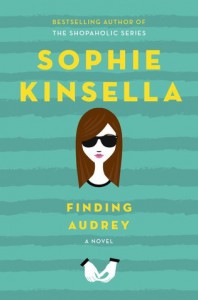
I'm so glad to finally have again read a Sophie Kinsella book I enjoyed. After her last two books (Wedding Night and Shopaholic to the Stars) which I found very annoying I was afraid that Finding Audrey would turn out just as strange. I'm happy to say that my worries were in vain. I think that the change of genre - from chick lit to YA - really did some good.
Finding Audrey is about a 14-year-old girl who was severely bullied by some of her classmates (we never find out what really happened) and is now staying at home and slowly adjusting to life again. Audrey's family is a bit crazy and all this leads to some very funny situations which often made me snort with laughter (a bit embarassing when you're reading the book in public). What I enjoyed a lot was that sometimes the parents are the sensible ones and sometimes the teenagers are. In the end not all the secrets are revealed and not all storylines come to an end. But that really doesn't matter.
All in all a very enjoyable book. I hope that with this novel Sophie Kinsella has found a way back to her old writing skills and will keep us further entertained in the future.
(I received a free digital copy via Netgalley/the publisher. Thanks for the opportunity!)
 6
6
Tail Gait by Rita Mae Brown
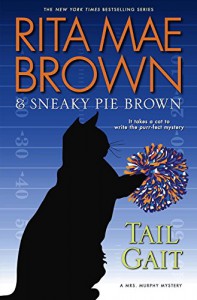
The 23rd Mrs Murphy mystery uses a different method than other books in this series: the solution for the murder of a UVA history professor has a lot to do with what happened during the American war of independence. Thus, there are two storylines, the usual one which tells about what is happening in 2015 and another one which is set during the war. The reader has to get used to two sets of characters. The ones in the 18th century are described quite well and I really liked this storyline, how it tells about the prisoners of war etc. I don't know much about this war and now I'm a little more familiar with it.
The modern story and the actual crime however were actually quite poor. The characters weren't worked out very well, it was obvious why the professor had been killed and also who was the killer. Harry's naiveté towards danger kind of annoyed me, it was worse than in other volumes of the series.
All in all I was rather disappointed by the book. I had high hopes for it because I enjoyed the last volume very much but this one just didn't grab me.
(I received a free digital copy via Netgalley/the publisher. Thanks for the opportunity!)
 5
5
Falling in Love by Donna Leon
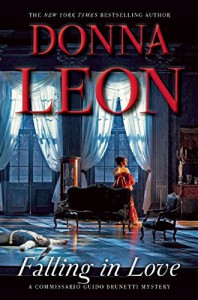
This 24th Commisario Brunetti mystery is an exception in this series as a former main character, Flavia Petrelli, makes another appearance. This rarely happens in Donna Leon's books, apart from the main cast(Brunetti's family and friends, the police corps and the people working in the various places Brunetti frequently visits) all characters usually don't appear more than once. I was looking forward to this because Flavia is a very memorable character and it had been a while since her last appearance.
I also enjoyed that parts of the book were told from her perspective, also something uncommon in this series. The setting at the opera was also well-chosen. It reminded me of the first book, Death at La Fenice, one of the most memorable and best crime novels I've ever read.
But even though all the conditions were set for me to expect a great mystery I still found the book rather mediocre. I found Brunetti and his colleagues quite slow-witted: my Italian is very rudimental but I saw the meaning of "É mia" much faster than any of the police did. I also found Signorina Elettra's strike rather ridiculous and wondered why no one found Alvise's suspension without payment weird.
On the positive side I liked the idea of the stalker, something I find very scary. The show-down was great but I wish that the stalker hadn't died and we would have found out more about her motives and why it was exactly Flavia she was after.
(I received a free digital copy via Netgalley/the publisher in exchange for an honest review. Thanks for the opportunity!)
 9
9
A Boy's Own Story by Edmund White

A Boy's Own Story is about a young boy's coming of age and his coming out in the 1950s. It is told in a very sensitive voice and the language used is very beautiful. At the beginning of the book there is a very explicit sex scene. I was quite surprised at that because I had never expected that. I've read a lot of books by John Irving who especially in his later work uses a lot of sex scenes as well but never anything like that.
I always enjoy reading coming of age stories including the ones set at boarding schools and this book was no exception. I often disliked the main character (particulary at the end) but the book was still great and I'm looking forward to reading the next volume in this trilogy.
(I received a free digital copy via Netgalley/the publisher. Thanks for the opportunity!)
 6
6
Tarka the Otter
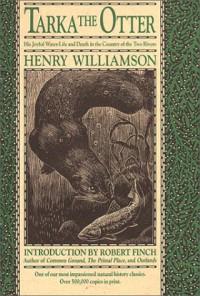
Tarka the Otter is written in a very realistic way which doesn't humanize the animals. The language is beautiful and - not being a native speaker - I also learned lots of new words. Once I realized that by dogs, bitches and cubs the otters were meant and not actual dogs I also understood what was going on!
This book is often called a children's book but I surely wouldn't have liked it as a child. In spite of all the positive things mentioned above it was still all in all quite boring.
 7
7
Centuries of Change by Ian Mortimer

In his latest book historian Ian Mortimer examines a much longer period of time than he did in his previous work: Mortimer takes a look at the past 1000 years and examines century by century the most important changes in the respective periods. His aim is to find out which of the past ten centuries experienced the most changes.
Centuries of Change is written in a very readable way. There was lots of information in it I already knew but now looked at again from a different perspective. I just have some minor critic: the further Ian Mortimer progressed in history, the less detailed he was. This is understandable, however: the early centuries just weren't as fast-paced as the later ones. There were still major changes but just not so many of them. At the end of each chapter the principal agent of change for each century is described. In the nineteenth century Karl Marx is named here. Having read the chapter I was a bit astonished by that: Karl Marx is hardly mentioned before and then he is suddenly the most important person of the century. This seemed a bit weird.
One of the best parts of the book is Ian Mortimer's way of figuring out which century really experienced the most changes. To do that he uses Maslow's hierarchy of needs and constructs his own pyramid from that. He then applies different statistical methods constructed by others to rank the centuries for each item. Ian Mortimer finally comes to the conclusion that the twentieth century was the one with the most changes. To him - and also to me - this was a bit surprising: we both would have opted for the nineteenth century.
All in all this book was an enjoyable read, though not quite as entertaining as I'd hoped. I learned a lot from it and also could identify two centuries I definetely wouldn't have wanted to live in: the 13th (because of the Black Death) and the 17th (because of the wars, e.g. the 30-year-war in central Europe).
(I received a free digital copy via Netgalley/the publisher. Thanks for the opportunity!)







 1
1